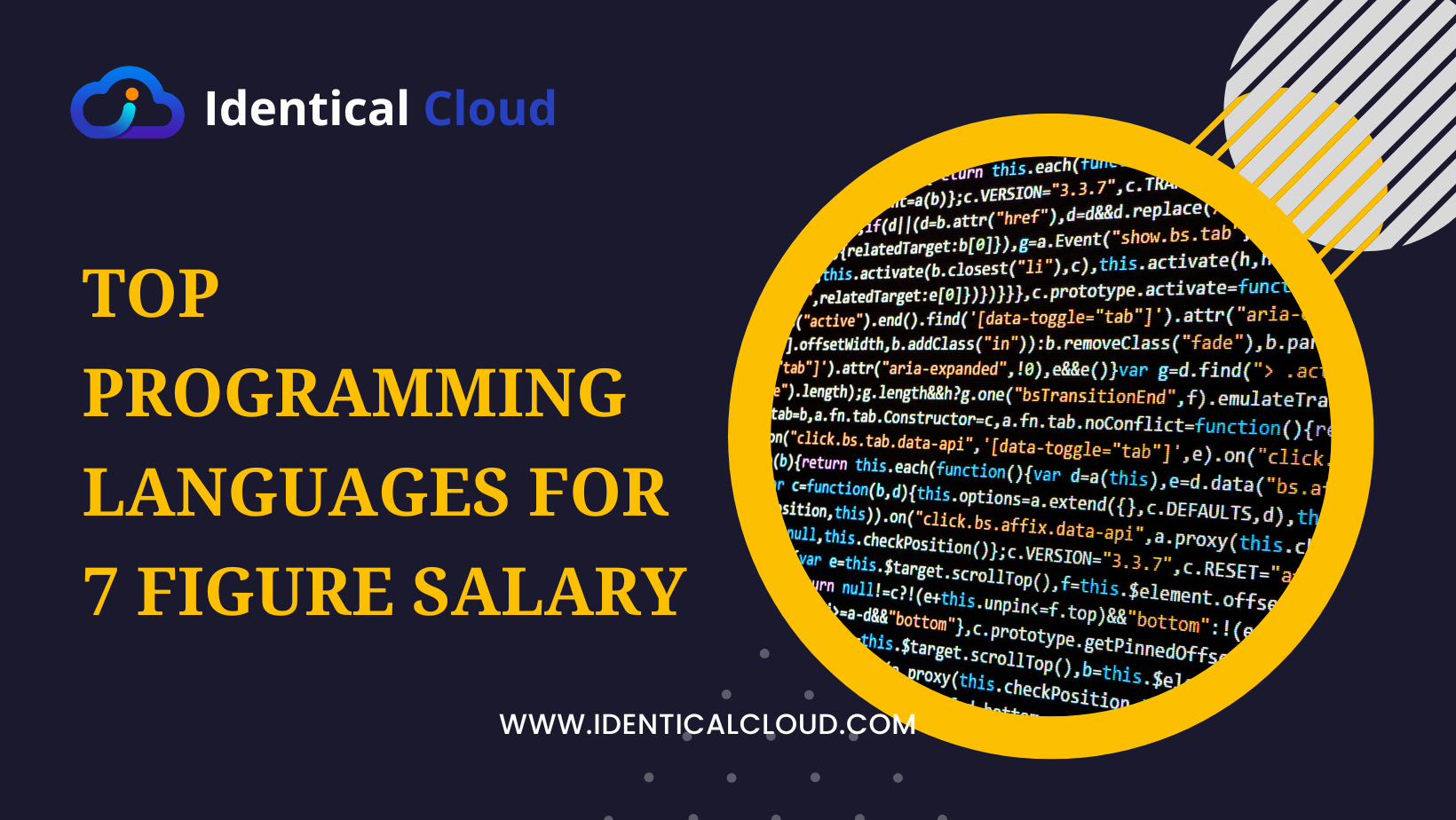
Top Programming Languages For 7 Figure Salary
Top Programming Languages For 7 Figure Salary
In today’s digital age, programming skills are in high demand. And if you’re looking to earn a 7-figure salary, there are a few programming languages that you should focus on.
Earning a seven-figure salary in the programming field is typically influenced by a combination of factors including skills, experience, expertise, and the industry you work in. While the programming language you specialize in can play a role, it’s important to note that high salaries are often a result of valuable skills and the impact you bring to an organization.
Here are the top programming languages for a 7-figure salary:
Python
Python is a general-purpose programming language that is used for a wide variety of tasks, including data science, machine learning, web development, and software development. It is a popular language among beginners and experienced programmers alike, and it is known for its readability, simplicity, and power.
Here are some of the key features of Python:
- Readability: Python code is typically very readable, which makes it easy to learn and understand.
- Simplicity: Python is a relatively simple language, which makes it easy to get started with.
- Power: Python is a powerful language that can be used to create complex applications.
- Open source: Python is an open-source language, which means that it is freely available to use and modify.
- Community: Python has a large and active community of users and developers, which provides support and resources for learning and using the language.
JavaScript (Node.js)
JavaScript is a versatile programming language that can be used for a wide variety of tasks, including web development, mobile development, and data science. Node.js is a runtime environment that allows JavaScript to be used to build server-side applications.
Here are some of the key features of Node.js:
- Asynchronous: Node.js is an asynchronous runtime environment, which means that it can handle multiple requests at the same time.
- Event-driven: Node.js is an event-driven runtime environment, which means that it only executes code when an event occurs.
- Single-threaded: Node.js is a single-threaded runtime environment, which means that it can only execute one task at a time. However, it can handle multiple requests by using a technique called event looping.
- Open source: Node.js is an open-source project, which means that it is freely available to use and modify.
- Community: Node.js has a large and active community of users and developers, which provides support and resources for learning and using the language.
Java
Java is a general-purpose programming language that is used for a wide variety of tasks, including web development, mobile development, and enterprise applications. It is a popular language among beginners and experienced programmers alike, and it is known for its robustness, scalability, and portability.
Here are some of the key features of Java:
- Robust: Java is a robust language that is designed to be reliable and secure.
- Scalable: Java is a scalable language that can be used to build large and complex applications.
- Portable: Java is a portable language that can be run on a variety of platforms.
- Object-oriented: Java is an object-oriented language, which means that it models real-world objects in code.
- Multithreaded: Java is a multithreaded language, which means that it can handle multiple tasks at the same time.
- Open source: Java is an open-source language, which means that it is freely available to use and modify.
- Community: Java has a large and active community of users and developers, which provides support and resources for learning and using the language.
Go (Golang)
Go is a programming language that was developed by Google in 2009. It is a general-purpose language that is designed to be simple, reliable, and efficient. Go is becoming increasingly popular, and it is used by a variety of companies, including Google, Netflix, and Uber.
Here are some of the key features of Go:
- Simple: Go is a relatively simple language that is easy to learn and understand.
- Reliable: Go is a reliable language that is designed to be free of errors.
- Efficient: Go is an efficient language that can be used to build high-performance applications.
- Concurrent: Go is a concurrent language that can handle multiple tasks at the same time.
- Open source: Go is an open-source language, which means that it is freely available to use and modify.
- Community: Go has a large and active community of users and developers, which provides support and resources for learning and using the language.
Scala
Scala is a hybrid programming language that combines the features of object-oriented programming and functional programming. It was designed by Martin Oderski and first released in 2003. Scala is a popular language among programmers, and it is used by a variety of companies, including Twitter, Netflix, and Airbnb.
Here are some of the key features of Scala:
- Object-oriented: Scala is an object-oriented language, which means that it models real-world objects in code.
- Functional: Scala is a functional language, which means that it emphasizes the use of functions and avoids side effects.
- Statically typed: Scala is a statically typed language, which means that the types of variables and expressions are checked at compile time.
- Expressive: Scala is an expressive language that allows programmers to write concise and elegant code.
- Scalable: Scala is a scalable language that can be used to build large and complex applications.
- Open source: Scala is an open-source language, which means that it is freely available to use and modify.
- Community: Scala has a large and active community of users and developers, which provides support and resources for learning and using the language.
Rust
Rust is a modern systems programming language that is designed to be safe, fast, and expressive. It was created by Mozilla in 2010 and is still under active development. Rust is becoming increasingly popular, and it is used by a variety of companies, including Dropbox, Cloudflare, and Amazon Web Services.
Here are some of the key features of Rust:
- Safety: Rust is a safe language that prevents common programming errors, such as memory leaks and data races.
- Speed: Rust is a fast language that can be used to build high-performance applications.
- Expressiveness: Rust is an expressive language that allows programmers to write concise and elegant code.
- Concurrency: Rust supports concurrency and parallelism, which makes it ideal for building scalable applications.
- Memory management: Rust has a unique memory management system that eliminates the need for garbage collection.
- Open source: Rust is an open-source language, which means that it is freely available to use and modify.
- Community: Rust has a large and active community of users and developers, which provides support and resources for learning and using the language.
C++
C++ is a general-purpose programming language that is used for a wide variety of tasks, including operating systems, embedded systems, and game development. It is a powerful and flexible language that can be used to create complex applications.
Here are some of the key features of C++:
- Powerful: C++ is a powerful language that can be used to create complex applications.
- Flexible: C++ is a flexible language that can be used for a wide variety of tasks.
- Object-oriented: C++ is an object-oriented language, which means that it models real-world objects in code.
- Compiled: C++ is a compiled language, which means that the code is converted into machine code before it is executed.
- Standardized: C++ is a standardized language, which means that there is a single specification that all implementations must follow.
- Open source: C++ is an open-source language, which means that it is freely available to use and modify.
- Community: C++ has a large and active community of users and developers, which provides support and resources for learning and using the language.
Swift (iOS development)
Swift is a general-purpose, multi-paradigm, compiled programming language developed by Apple Inc. and the open-source community. First released in 2014, Swift was designed to replace Apple’s earlier programming language, Objective-C.
Here are some of the key features of Swift:
- Safe: Swift is a safe language that prevents common programming errors, such as memory leaks and undefined behavior.
- Fast: Swift is a fast language that can be used to build high-performance applications.
- Expressive: Swift is an expressive language that allows programmers to write concise and elegant code.
- Modern: Swift is a modern language that incorporates features from other languages, such as Python and Ruby.
- Open source: Swift is an open-source language, which means that it is freely available to use and modify.
- Community: Swift has a large and active community of users and developers, which provides support and resources for learning and using the language.
Kotlin
Kotlin is a cross-platform, statically typed, general-purpose programming language with type inference. Kotlin is designed to interoperate fully with Java, and the JVM version of its standard library depends on the Java Class Library, but type inference allows its syntax to be more concise. Kotlin mainly targets the JVM, but also compiles to JavaScript or native code (via LLVM).
Here are some of the key features of Kotlin:
- Safe: Kotlin is a safe language that prevents common programming errors, such as null pointer exceptions and type errors.
- Concise: Kotlin is a concise language that allows programmers to write code that is shorter and easier to read.
- Expressive: Kotlin is an expressive language that allows programmers to write code that is clear and concise.
- Interoperable with Java: Kotlin is interoperable with Java, which means that Kotlin code can be called from Java code and vice versa.
- JVM-based: Kotlin can be compiled to run on the JVM, which makes it a good choice for building Android apps.
- Native compilation: Kotlin can also be compiled to native code, which makes it a good choice for building high-performance applications.
- Open source: Kotlin is an open-source language, which means that it is freely available to use and modify.
- Community: Kotlin has a large and active community of users and developers, which provides support and resources for learning and using the language.
SQL (Database Management)
SQL (Structured Query Language) is a language designed for managing data in relational database management systems (RDBMS). SQL statements are used to perform tasks such as retrieving, inserting, updating, and deleting data in a database.
Here are some of the key features of SQL:
- Data definition: SQL can be used to create, alter, and drop tables, views, and other database objects.
- Data manipulation: SQL can be used to insert, update, delete, and select data from tables.
- Data control: SQL can be used to grant and revoke permissions to users on tables and other database objects.
- Transactions: SQL supports transactions, which are a set of operations that are performed together as a unit.
- Referential integrity: SQL supports referential integrity, which ensures that the data in one table is consistent with the data in another table.
- Security: SQL supports security features, such as user authentication and authorization, to protect data.
These are just a few of the programming languages that can lead to a 7-figure salary. The specific language that you choose will depend on your interests and skills. However, all of these languages are in high demand and can offer a lucrative career path.
Remember that high earning potential also depends on factors such as the level of expertise, the specific role you take on, the industry you work in, and the impact you bring to the organization. It’s important to continuously update your skills and stay informed about industry trends to maximize your earning potential.








